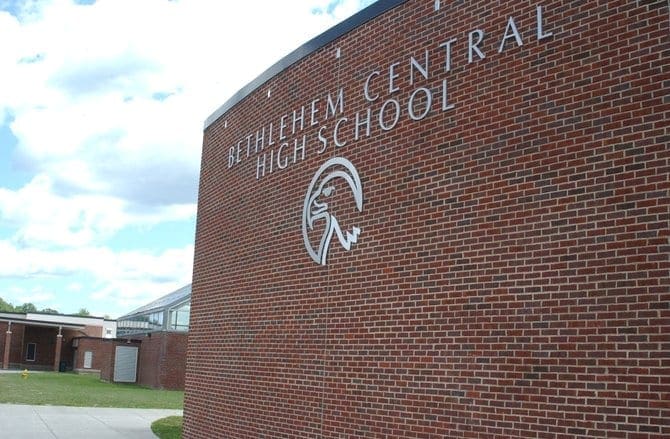Junior is making the fight against global warming personal
DELMAR — While world leaders continue their global climate summit in Glasgow, Scotland, one BC student is working to make the effects of climate change something we understand on a more local level.
Nikhilesh Radosevich, a junior at Bethlehem Central High School, is the creator of a website called earthstripes.org. The site allows users to learn more about the impacts of climate change in their own hometown with maps and a search engine that shine a spotlight on increasing temperatures, changing precipitation patterns and prevailing attitudes toward climate change in different communities across the country and around the world.
Visitors to the site can enter their zip code, city or county and readily find climate change information tailored to them and their location.
Radosevich also gives visitors a unique way to easily share what they’ve learned about what’s happening locally. He does this by partnering with online retailer Zazzle so people can purchase magnets, mugs, neckties and face masks featuring a simple bar graph showing local warming data trends over 100-plus years.
With stripes in shades of blue (lower in annual temperature) and red (higher in annual temperature), the warming trends in any community are easy to see and easy to explain.
The teen got the idea for the website and for the location-based merchandise when he saw a local meteorologist wearing a striped tie showing the worldwide global warming trend. It turned out that a professor named Ed Hawkins at the University of Reading in the U.K. created the “Show Your Stripes” images using scientific data and the red and blue stripes to simplify the data and make it easy to understand.
Radosevich decided he wanted to do something similar but make it more personalized.
“When it’s more personalized to you, it lets you tell a better story,” said Radosevich.
Over several months, Radosevich created his website by overlaying data from the top science agencies and universities with map coordinates to create more targeted data and stories to help people understand climate change. Some of the sources used by Radosevich include the Environmental Protection Agency (EPA), the National Oceanic and Atmospheric Administration (NOAA) and a non-profit called Berkeley Earth.
He also uses information from the Yale Climate Opinion Survey 2020 to help describe a community’s attitude toward climate change by location. The survey shows that 78 percent of adults in Albany County believe global warming is happening, 6 percent higher than the national average of 72 percent of adults.
An early start and a perfect score
Web design and computer science is not something new for Radosevich. His interest in computer science, he says, began back in third grade when his mother signed him up for a Scratch class at summer camp.
“I remember not wanting to go because I just imagined a lot of noise and a lot of kids scratching things and that didn’t sound fun,” said Radosevich. “It turned out to be a really fun computer camp where I learned how to make programs and I ended up really liking it.”
Since then, Radosevich has been creating websites for family members, friends and groups he’s involved in, like the Boy Scouts. He studies computer science at the high school and was recently notified by the College Board that he had received a perfect score on the AP Computer Science Principles exam he took last spring.
The AP exams are scored on a scale of 1 to 5. Radosevich not only received a score of 5 he also received a perfect score and was one of only 335 students out of approximately 115,000 worldwide who earned a perfect score. The head of the College Board’s Advanced Placement program Trevor Packer described Radosevich’s perfect score as “so superior that it falls into an extremely select category” in his October 15 letter.
“We are extremely proud of Nikhil. His achievements are a testament to his impeccable work ethic and caring nature,” said BCHS Technology and Engineering Teacher Eric Fana. “I’ll be rocking my stripes in support!”
Radosevich, who is a president for the high school’s Computer Science Honor Society, said he plans to keep working on his earthstripes.org website to try to add more data from outside the United States and to focus on making some of his key environmental data from the EPA “pop.”
“Right now I’m working on a way to make the stripes available for any town or city in the world,” said Radosevich, who spent nearly 200 hours over the last several months on the website, adding, “but that requires a lot of math.”



